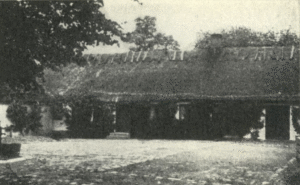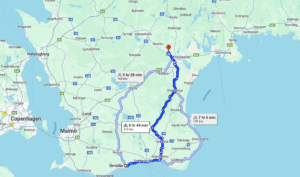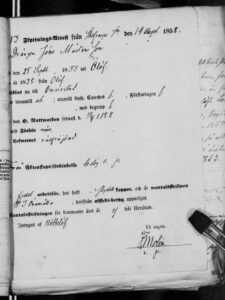In previous installments of the John Martinson Project, we’ve looked at his paternal and maternal ancestry. In this post, we’ll look at his childhood, adolescent, and young adult years.
This post is the fifth in the John Martinson Project series
In the previous installment, we learned how my great-great-grandfather Jöns spent his early childhood years at No. 16 Ölöv in the Östra Vemmenhög parish. At first it was a multi-generational household which included his maternal grandparents and an aunt, but they passed away when he was five years old. The growing family remained at No. 16 for another seven years. The father, Mårten, was listed as ägare or “owner”, and the family had a young piga (maid) working for and living with them.1 They were not wealthy by any means, but land ownership and hired help certainly signifies some level of comfort.
In 1845, the family left Östra Vemmenhög at the end of October.2 This is the time of year when work contracts and leases typically expired and could be renewed. The family took the opportunity to move to nearby Skivarp parish, Mårten’s birth parish, where they would become renters on a farm at No 11 Öremölla. At first glance, it seems like moving from an owned property to a leased property would have been a step down in their socioeconomic status. However, the farm in Ölöv had likely been inherited by Anna from her parents. It’s possible that the farm was too small to support a family of eight, or maybe or the soil was poor. Would a farm in Skivarp parish better meet the needs of Mårten’s growing family? I could not find evidence of any land redistribution process that would have forced their relocation.
While at No. 11 Öremölla, the family is able to employ a dräng (farm hand) each year, but no more piga – the girls are probably old enough to help at this point.3
 As a point of reference, here is a photo of the farm at No. 7 Öremölla as it existed in the 1930’s.4 This is probably very similar to what Mårten’s farm would have looked like: a long building (one end for the family, the other possibly for animals), low ceilings, and a thatched roof.
As a point of reference, here is a photo of the farm at No. 7 Öremölla as it existed in the 1930’s.4 This is probably very similar to what Mårten’s farm would have looked like: a long building (one end for the family, the other possibly for animals), low ceilings, and a thatched roof.
In May of 1846, six months after arriving at Skivarp, Anna gave birth to a son Sven. However, just a year later in 1847, the next older son Anders died at the age of six.5 The records do not identify a cause of death, so I don’t know if it was disease or accidental. Sven was the last child born to the family, now complete with four sons and two daughters.
The fall of 1851 is something of a turning point for the family. Both Nils and Jöns leave to work elsewhere. Nils was 20 years old, Jöns was 18. Nils leaves Skivarp parish to work on a farm in nearby Hemmesdynge parish. Jöns gains employment at nearby No. 20 Öremölla. The rest of the family, meanwhile, moved to nearby No. 13 Öremölla where Mårten is subsequently identified as åbo, meaning he has acquired a heritable lease on a farm.6 This was quite likely a step up for the family, to be on a farm that could be passed on to the next generation.
With the two older boys moved out, Mårten hires two young men as dräng to help with the farm labor.
Nils stays one year at Hemmesdynge, then moves on to one-year contracts at Källstorp and Solberga parishes respectively. He returns to No. 13 Öremölla in late 1854 to help his father and stays for the next six years. Jöns stayed at No. 20 Öremölla for just one year, then moves on to one-year contracts at No. 20 Skivarp and No. 12 Öremölla respectively. He also returns to No. 13 in late 1854. The presence of both sons for the 1855 crop year coincides with the departure of the other hired hands. Was this a happy reunion for the boys to return home? Or a sign of Mårten’s difficulty in finding quality hired help? Who knows. (For details and source citations for all the moving about, refer to the profile pages for Nils and Jöns.)
In the span of eight years, Jöns moves each year to work at a different farm. Twice he returned home, coinciding with years when his father appeared to be short-handed.

His last year in Skivarp was at No. 3 Öremölla.7 In August of 1858, he left for a new parish altogether: Önnestad.8 This parish is over 60 miles north of Skivarp. I have tried without success to figure out why he moved such a great distance. I looked in the moving registers for both parishes to see if there were other people moving back and forth between the two parishes – perhaps providing Jöns with a connection or “in” at the new parish. But I could find no evidence of anything like that.
It is unusual for farm hands to relocate in the summer. Usually employment contracts expire in late October. It is also unusual to travel so great a distance – and not easy to do, either. The railroad system had not yet developed in this part of Sweden, so he would have had to walk or ride in horse-drawn carts or carriages, or perhaps a combination of the two. He would have had to find lodging at inns along the way.
So this life-changing event for Jöns remains somewhat of a mystery, both in terms of timing and of destination.

The priest in Skivarp issued his moving certificate on August 14, 1858.9 Jöns presented it to the priest in Önnestad on September 23.10 The certificate may have been issued some days or weeks before he actually left Skivarp, but it’s more likely that he presented the certificate fairly soon upon his arrival in Önnestad. The certificate notes that he has a pleasing character, that he last took communion on April 18, 1858, that he is free to marry, and that taxes were paid for him at No. 3 Öremölla that year. So he certainly didn’t leave Skivarp under a cloud of scandal or mischief.
The certificate also shows that he had received a cowpox vaccination (skyddskoppor) as protection against smallpox.
I love that so many of these moving certificates have been preserved in Sweden’s National Archives! It’s a piece of paper that my ancestor actually carried on his person for at least a month.
Next time we’ll examine Jöns’ life in his newly-adopted parish of Önnestad.
1 Östra Vemmenhög HER, Östra Vemmenhög (M) AI:10 (1843-1846) Image 142 / Page 136 (AID: v113945.b142.s136, NAD: SE/LLA/13531)
2 Östra Vemmenhög Flyttning (Moving), Östra Vemmenhög (M) B:1 (1834-1850) Image 23 / Page 35 (AID: v113956.b23.s35, NAD: SE/LLA/13531)
3 Skivarp HER, Skivarp (M) AI:6 (1844-1850) Image 111 / Page 226 (AID: v111729.b111.s226, NAD: SE/LLA/13346)
4 Svenska gods och gårdar, äldre utgåvor (D, L, M, S) 4:Skåne:Sydvästra (1936) Image 4290 / Page 431 (AID: v951578.b4290.s431)
5 Skivarp Döda (Deaths), Skivarp (M) CI:3 (1846-1861) Image 540 / Page 99 (AID: v111745a.b540.s99, NAD: SE/LLA/13346)
6 Skivarp HER, Skivarp (M) AI:7 (1850-1856) Image 1570 / Page 294 (AID: v111730a.b1570.s294, NAD: SE/LLA/13346).
7 Skivarp HER, Skivarp (M) AI:8 (1857-1860) Image 1420 / Page 138 (AID: v111731a.b1420.s138, NAD: SE/LLA/13346)
8 Skivarp Moving, Skivarp (M) B:1 (1845-1860) Image 89 / Page 38 (AID: v111739.b89.s38, NAD: SE/LLA/13346)
9 Jöns Mårtensson moving certificate, Riksarkivet (Swedish National Archives), https://sok.riksarkivet.se/bildvisning/C0063083_00122
10 Önnestad Inflyttning Moving-In, Önnestad (L) B:2 (1851-1876) Image 25 / Page 21 (AID: v102374.b25.s21, NAD: SE/LLA/13507)
